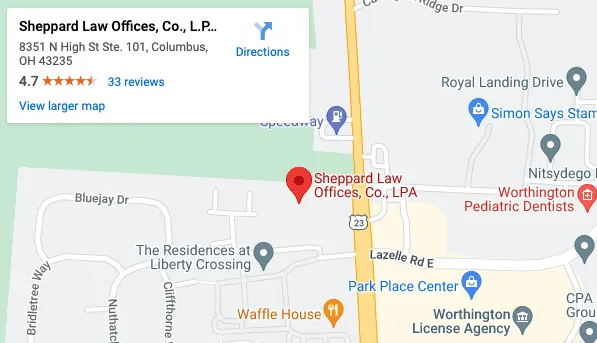Protecting Your Interests: A Guide to Divorce Modification in Columbus
Life changes after divorce, and sometimes your original agreement needs adjustments. Divorce modification allows you to revisit
aspects of your Ohio divorce decree, like child custody, child support, or alimony if certain circumstances arise. That ensures your agreement remains fair and reflects your current situation.
It’s important to understand the grounds for modification and the process involved in Ohio.
Quick Summary:
- Divorce modification allows you to legally change parts of your existing divorce agreement in Ohio. That can be due to life changes or if your ex-spouse violates the original terms. You’d file a motion with the court, which decides if the changes are justified.
- Common reasons for divorce modifications in Ohio include income changes, relocation, health developments, remarriage, cohabitation, or death.
- Common divorce modifications include child support, spousal support, property division, and bankruptcy impacts. Changes ensure fairness amid life’s unexpected challenges.
- In Ohio, the modification process involves filing a motion, serving notice, gathering evidence, attending a hearing, and awaiting the judge’s decision.
- Divorce modifications can be resolved through mediation and alternatives to litigation. Success depends on both parties’ willingness to communicate and compromise.
What is Divorce Modification?
Divorce modification is a legal process that allows you to change certain aspects of your existing divorce decree. It is a formal request to the court to change the terms of a divorce settlement.
Defining Modification of Divorce Decrees
A modification of a divorce decree in Ohio can be defined as any change made to the terms of the original decree on parenting or limited financial matters. Either party seeking a modification may start the proceedings by filing a motion with the court. The court must also ultimately determine whether the modification is warranted.
What are the Common Grounds for Divorce Modifications in Ohio?
In Ohio, requesting a change to your divorce decree requires a formal court filing outlining the reasons for the modification. Even if both parties agree to the changes, a judge’s approval is usually necessary to make them official.
Common reasons for modification requests include:
- Significant income or asset alteration
- Income change resulting from retirement
- Relocation of one of the ex-spouses
- Serious health developments of an ex-spouse or child
- Remarriage
- Certain instances of one ex-spouse’s cohabitation with others
- Death of an ex-spouse or a child
Considering a Modification? Explore Common Types of Divorce Modifications
While divorce aims for a permanent resolution, life throws curveballs. Divorce modifications let you review parts of your original agreement if things change. Here’s a breakdown of the common modification types:
Child Support Modifications
Substantial income changes may lead to a child support modification request. Job changes or loss can impact support. Medical insurance for children may also need adjusting.
Spousal Support Modification (Alimony)
Spousal support can be modified if the court retains jurisdiction. Changes in income can affect the amount. It ends with death, remarriage, or potentially cohabitation.
Property Division
Marital property division usually remains unchanged unless both parties agree. Court orders may be enforced but not modified unless ambiguous.
Bankruptcy and Divorce Modification
In rare cases, bankruptcy may affect divorce orders, especially on debt division. Spousal support might be ordered if one party takes on debt in the divorce decree and then declares bankruptcy. It helps ease the other party’s financial burden.
Ohio courts aim to ensure modifications to a divorce decree benefit all parties, especially the child. They consider types carefully for the best interests of everyone involved.
How To Seek Modification: The Divorce Modification Process in Ohio
Life after divorce can be unpredictable. Sometimes, your original agreements need adjustments to reflect these changes. Here’s a simplified breakdown of the divorce modification process in Ohio:
- Initiating the Process: One party files a motion with the court outlining the desired modifications and the reasons why (e.g., job loss, relocation, changes in child’s needs).
- Serving Notice: The other party receives a copy of the motion and has time to respond.
- Gathering Evidence: Both parties can submit evidence to support their positions, including financial documents, medical records, or witness testimonies.
- The Hearing: A judge hears arguments from both sides and considers the original decree, the child’s best interests (in child custody cases), and any presented evidence.
- Judge’s Decision: The judge issues a ruling, either granting the modification, denying it or modifying the original decree in a specific way.
Are There Any Mediation and Alternatives in Divorce Modification?
The courtroom isn’t always the only path to resolving divorce modifications in Ohio. We explore alternative approaches that can offer benefits beyond litigation below:
Mediation
That involves a neutral third party facilitating communication and negotiation between you and your ex-spouse. A mediator can assist in finding solutions and understanding perspectives. They may help achieve a mutually agreeable modification without a judge’s involvement.
Alternatives to Consider
- Collaborative Law: This involves both parties working with their lawyers who are specifically trained to help collaboration instead of litigation.
- Arbitration: A neutral third party, like a judge, listens to both sides and makes a binding decision. However, unlike mediation, there’s less opportunity for collaborative problem-solving.
The success of this relies on both parties’ willingness to communicate and compromise. Consulting an attorney helps decide if mediation fits your situation. They can also represent you, ensuring your interests during mediation. Exploring these options can lead to a smoother resolution for your divorce modification.
Why Do I Need A Divorce Modification Attorney in Ohio?
After divorce, life changes, and your initial agreement may not match. Your circumstances might differ from before. In Ohio, a divorce decree modification lets you adjust child custody or support. It suits your current needs better.
Here’s why you might consider an attorney for a divorce modification in Ohio:
- Understanding complex legalities: Ohio law requires a “substantial change in circumstances” to modify your agreement. A divorce modification attorney can determine if your situation qualifies. They’ll guide you through the legal process.
- Building a strong case: Successfully modifying your agreement requires presenting evidence to the court. A lawyer helps gather documents and argues for your desired outcome effectively.
- Protecting your interests: Divorce modifications can be contentious. A family law attorney protects your rights. They negotiate on your behalf when necessary.
Call Our Columbus OH Divorce Modification Attorney Now!
Divorce modifications can be a complex legal undertaking, especially when emotions run high. Consulting a lawyer in Ohio is vital to ensure a smooth and successful modification process.
At Sheppard Law Offices, we are dedicated to providing caring and effective family law services to our clients in Columbus. With our OH family law attorneys by your side, you can approach your modification confidently. Our legal team will advocate for a fair outcome.
We have the experience, reputation, and compassion needed for family law cases. With offices in Columbus, Mount Vernon, and Newark, we can help you with the following practice areas:
- Bankruptcy
- Tax
- Estate Planning and Probate
Contact us today to schedule your free consultation.


